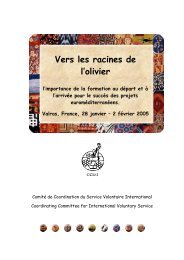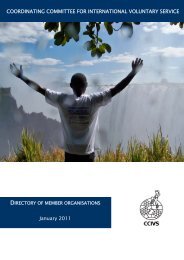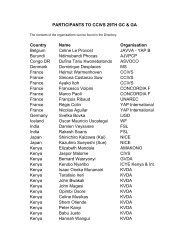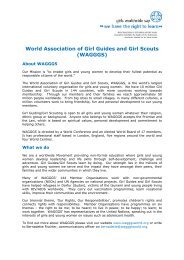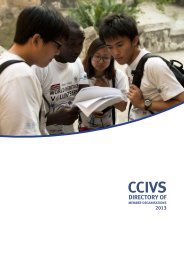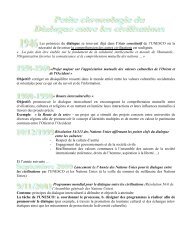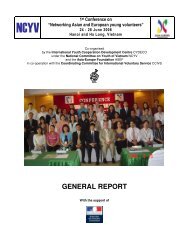Report of the Seminar 2005 - CCIVS
Report of the Seminar 2005 - CCIVS
Report of the Seminar 2005 - CCIVS
You also want an ePaper? Increase the reach of your titles
YUMPU automatically turns print PDFs into web optimized ePapers that Google loves.
EU-LA <strong>Seminar</strong><br />
The Latin-American group focused on <strong>the</strong> added value <strong>of</strong> international voluntary service and<br />
found that <strong>the</strong>re were different advantages:<br />
• To increase solidarity;<br />
• To discover that many different places also have needs;<br />
• Great personal satisfaction and personal growth;<br />
• Open mind towards cooperation;<br />
• Links with different associations and countries, an access to new resources and experiences;<br />
• To cooperate in <strong>the</strong> creation and growth <strong>of</strong> new or small associations;<br />
• To give a world wider vision;<br />
• It allows Latin American ethnical minorities to notice that <strong>the</strong>re are some people interested in<br />
cooperating with <strong>the</strong>m. In Latin America <strong>the</strong>re are some problems <strong>of</strong> racism against <strong>the</strong>m;<br />
• It motivates local communities, by seeing foreign volunteers cooperating with <strong>the</strong>m;<br />
• It is a new model <strong>of</strong> volunteering. It is a laic and non-political service. It is cooperation, not an<br />
imposition or “salvation” volunteering;<br />
• It gives Latin-American people <strong>the</strong> chance to discover a new way <strong>of</strong> relating to people. They<br />
learn not to suspect <strong>the</strong>ir equals;<br />
• Latin-American people find out about new values, which are devaluated in <strong>the</strong>ir countries;<br />
• It shows new methodologies and solutions to solve <strong>the</strong> same problems;<br />
• International volunteers and national volunteers can work hands in hands;<br />
• It allows to see <strong>the</strong> good side <strong>of</strong> differences, but also <strong>the</strong> good side <strong>of</strong> similarities.<br />
How to find resources to organise projects<br />
Participants split into three groups (with no criteria) and <strong>the</strong>ir work was reported in plenary. The<br />
content is reported below:<br />
The first group started with <strong>the</strong> problems that are faced to find funds: lack <strong>of</strong> economic capacity <strong>of</strong><br />
<strong>the</strong> organisations developing projects so <strong>the</strong>y cannot cover <strong>the</strong> minimal expenses for volunteers and<br />
material, and <strong>the</strong>y cannot develop <strong>the</strong>ir skills. There is a need for more pr<strong>of</strong>essionalism and skill<br />
development. There is also a lack <strong>of</strong> recognition at institutional level (foundations, governments,<br />
etc.) and an economical dependence on volunteers’ fees. The ideology can also be a problem.<br />
At <strong>the</strong> level <strong>of</strong> volunteers’ placements (sending, recruitment, commitment <strong>of</strong> volunteers,<br />
cancellations), <strong>the</strong>re is a lack <strong>of</strong> consciousness toward participation in social matters via voluntary<br />
service. Because <strong>of</strong> difficult socio-economical realities, volunteers have o<strong>the</strong>r priorities. Visas are<br />
also a problem: <strong>the</strong>re is a lack <strong>of</strong> preparation in relation to volunteerism and specific projects<br />
Finally, <strong>the</strong> coordination <strong>of</strong> projects is also on issue: it is difficult to find and trust people who can<br />
be responsible for projects, and would stay in <strong>the</strong> organization and help projects continue.<br />
The second group started with fundraising and inscription fees. In Europe, <strong>the</strong>re is governmental<br />
support (from related ministries and local governments – differs by country) and funds coming from<br />
<strong>the</strong> European Commission (e.g. EVS), and some funds can be raised from business sector. There is<br />
occasional support from embassies and <strong>the</strong> money coming from inscription fees (encourage and<br />
support volunteers to do <strong>the</strong>ir own fundraising in <strong>the</strong>ir country before departure), donations,<br />
contributions from host projects (food and accommodation) and extra-fees (due to policy and<br />
agreement with non-regular partners). ICYE also has <strong>the</strong> policy <strong>of</strong> quotas. In Latin America, funds<br />
can come from <strong>the</strong> collaboration with local government, <strong>the</strong> Development Bank, and some special<br />
support from European (France and Germany) <strong>of</strong>fice sponsors. There are also donations (from<br />
individuals and companies), and <strong>the</strong> contributions from participants.<br />
The conversation moved to <strong>the</strong> projects <strong>the</strong>mselves. As far as <strong>the</strong> fees are concerned, <strong>the</strong>re are from<br />
3000 to 5000 EURO contributions or EVS (European Voluntary Service) grants. A workcamp fee is<br />
between 60 to 220 EURO. The group made a recommendation to reduce costs, for example by<br />
12



